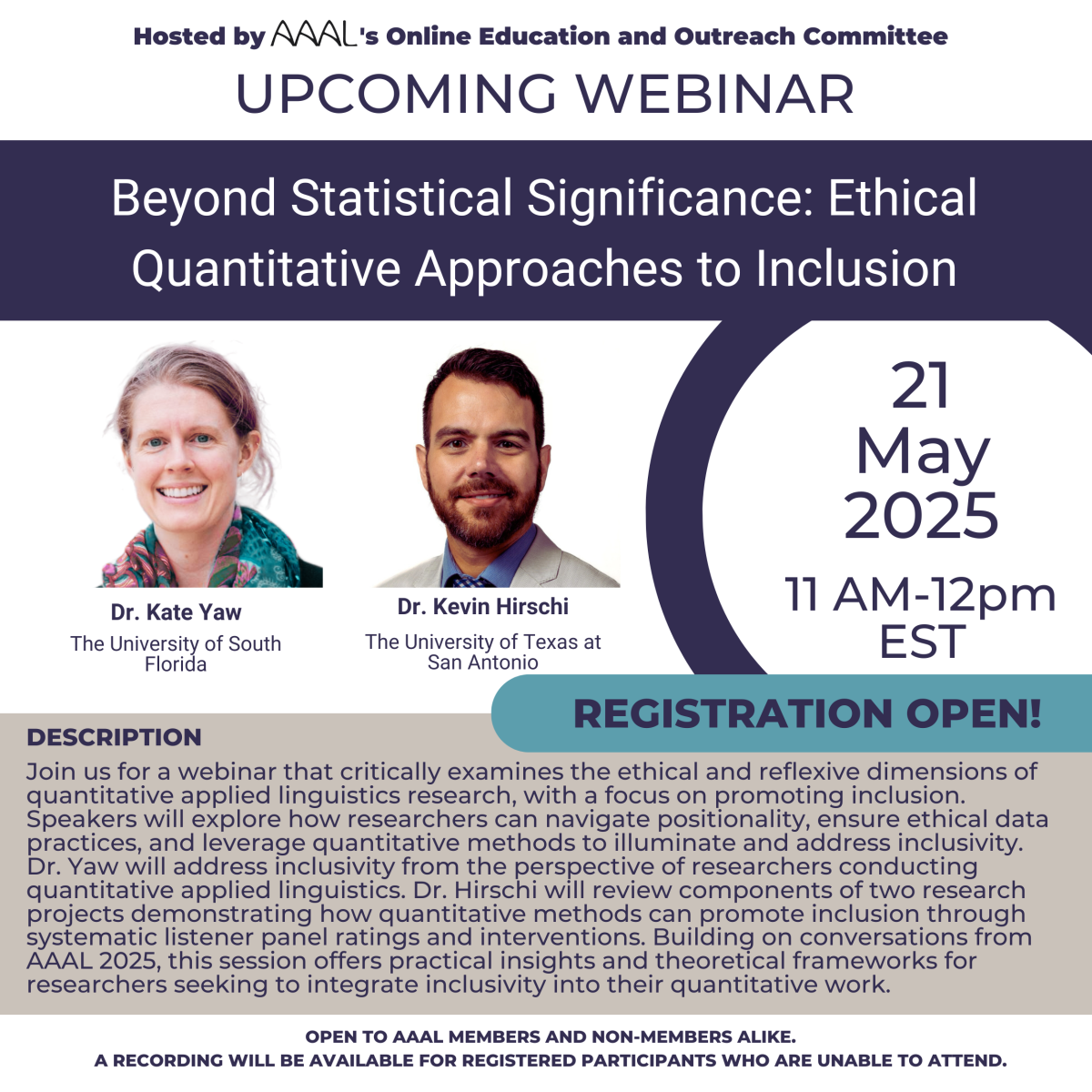AAAL Webinar: Beyond Statistical Significance: Ethical Quantitative Approaches to Inclusion
Event Details
Beyond Statistical Significance: Ethical Quantitative Approaches to Inclusion
Join us for a webinar that critically examines the ethical and reflexive dimensions of quantitative applied linguistics research, with a focus on promoting inclusion. Speakers will explore how researchers can navigate positionality, ensure ethical data practices, and leverage quantitative methods to illuminate and address inclusivity. Dr. Yaw will address inclusivity from the perspective of researchers conducting quantitative applied linguistics. Dr. Hirschi will review components of two research projects demonstrating how quantitative methods can promote inclusion through systematic listener panel ratings and interventions. Building on conversations from AAAL 2025, this session offers practical insights and theoretical frameworks for researchers seeking to integrate inclusivity into their quantitative work.
Title: The humans behind the study: Researcher inclusivity in quantitative applied linguistics scholarship
Abstract: In quantitative research, inclusivity is a key consideration across all stages of the research process, including but not limited to sampling practices (Plonsky, 2023), data collection instruments (Bedin et al., 2024), and accessibility of research findings (Marino & Kessler, 2025). Less often discussed as an issue of inclusivity in quantitative research, however, is the role that researchers themselves play. For instance, statistical analyses can be associated with an illusion of objectivity (Berger & Berry, 1988), which may give the mistaken impression that researchers’ nuanced backgrounds, lived experiences, strengths, and weaknesses do not directly impact the outcomes of quantitative research. Indeed, training in quantitative research methods may unintentionally reinforce this impression by focusing primarily on procedural aspects of conducting research such as compliance with ethical review board regulations or steps required for a particular statistical analysis (Wood et al., 2024). Yet quantitative research requires a multitude of researcher decisions throughout the research process, and these decisions impact not only our findings but also the conclusions that can be drawn from them.
In this session, I approach inclusivity from the perspective of the humans conducting quantitative applied linguistics research. Drawing on my collaborative work on quantitative research ethics, I focus on the impact of researchers’ day-to-day decisions on the research process and make the argument that inclusivity among researchers is an important component for quantitative research to be truly generalizable, representative, ethical, and accessible. I conclude with suggestions for increasing inclusivity among quantitative researchers, focusing on access to training and collaboration.
Presenter bio: Katherine (Kate) Yaw is an Assistant Professor of Applied Linguistics at the University of South Florida (Tampa, FL, USA). She holds a PhD in Applied Linguistics from Northern Arizona University. She has worked in language education since 2007, with experience in English language teaching, teacher training, and program administration. Her research interests include perception and production of speech, language attitudes, cognitive processing of L2-accented speech, and the role of listeners in successful communication, along with quantitative research ethics.
Title: Inclusive quantitative research in L2 pronunciation: A focus on intelligibility
Abstract: Research in second language pronunciation has shifted significantly in recent decades, moving away from 'native' accent standards toward prioritizing intelligibility (Levis, 2020). Given that accent is intrinsically linked to identity, examining both listeners and speakers through an intelligibility framework can inform more inclusive pedagogical approaches. This presentation reviews components of two research projects that demonstrate how quantitative methods can promote inclusion through systematic listener panel ratings and interventions that follow the Intelligibility Principle (Levis, 2005). The first study, a mobile-assisted pronunciation investigation (Hirschi, 2024), involved monolingual and multilingual listeners (n=30) evaluating pre- and posttest recordings of English learners (n=69). Results showed that a 10-hour intervention, focusing primarily on high functional load segmental contrasts, improved speaker intelligibility but did not change accentedness. Notably, listeners from diverse backgrounds demonstrated similar comprehension abilities despite attending to different linguistic features. The second study (Hirschi et al., in press) developed AI and acoustic measurement tools optimized for accented English, providing computer-generated feedback on intelligibility. Participants (n=90) showed greatest improvement with multimodal feedback, achieving enhanced intelligibility while maintaining their accent characteristics, as verified by a listener panel (n=30). The presentation concludes with research and pedagogical implications for L2 pronunciation instruction and broader applications in language teaching and research.
Presenter bio: Kevin Hirschi is an Assistant Professor in the Bicultural-Bilingual Studies Department at the University of Texas at San Antonio. His research interests center on second language pronunciation with a focus on the development and assessment of intelligibility using human perception and computational measurement. In his research, he leverages large datasets of L2 speech, listener-based studies, and machine learning technologies for analyses of speech features with a focus on effective communication amongst speakers and listeners from different backgrounds in various contexts. His recent projects include a study on data-driven learning for pronunciation, AI-based segmental and suprasegmental feedback for L2 intelligibility, and a review of accent bias in pre-trained Automatic Speech Recognition models. His publications have appeared in TESOL Quarterly, Language Teaching Research Quarterly, Pronunciation in Second Language Learning and Teaching Proceedings, and INTERSPEECH. He has taught language, teaching methods, and research methods courses at institutions in three countries and has engaged in teaching and teacher training as a Peace Corps Volunteer and US Department of State English Language Fellow.

